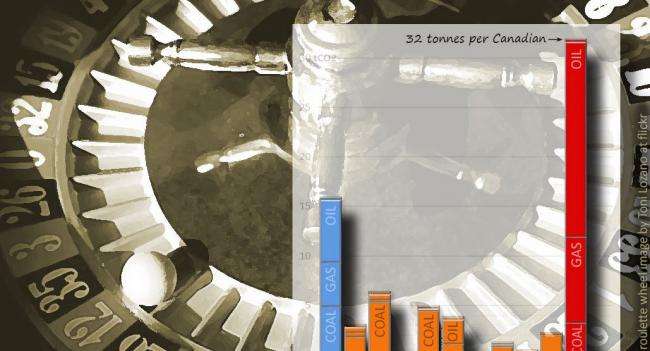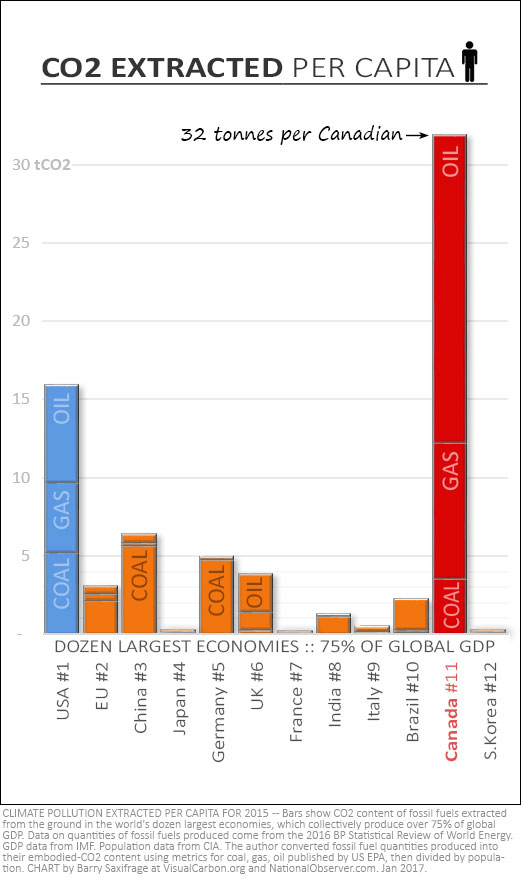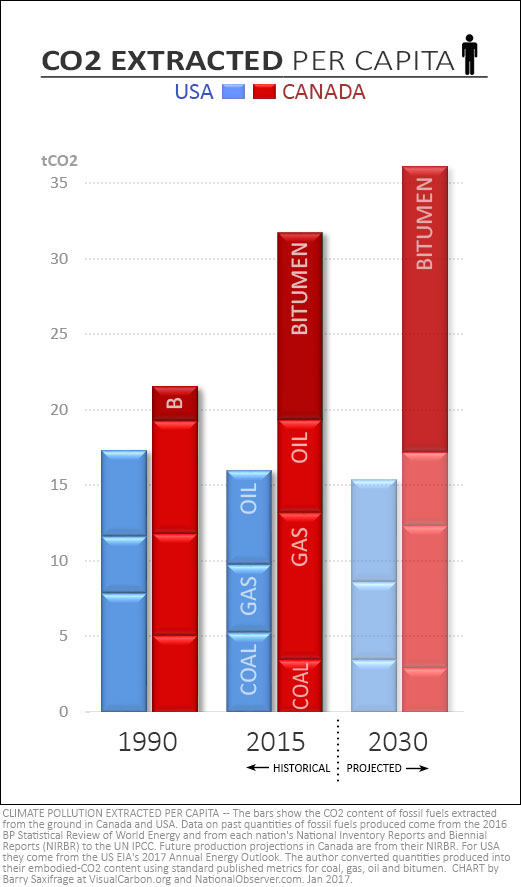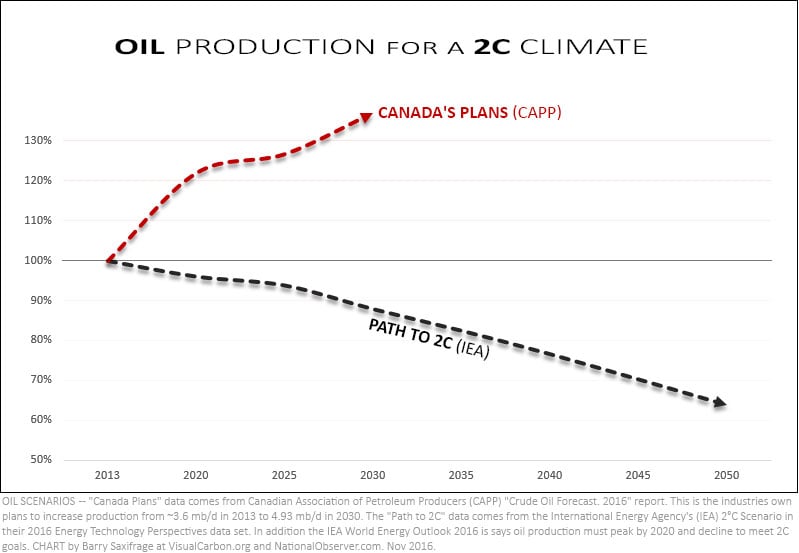Articles Menu

In Opinion, Energy, Politics | February 21st 2017
#632 of 632 articles from the Special Report:Race Against Climate Change
Did you know that:
Well, I was certainly surprised by the extreme scale of what we're doing when my spreadsheet spit out the initial numbers. So I asked around and spent weeks researching deeper. Here's what I found out:
It turns out we've built ourselves an economy that must dig up and sell extremely high levels of climate pollution per capita – in the form of fossil fuel carbon — just to function properly. And we are planning absolutely gigantic increases on top of that. This yields well-known short-term benefits from selling so much climate- polluting fuel. But it also carries supersized risks to the stability of our climate and our economy. These are rarely mentioned and are now surging to potentially dangerous levels.
A series of recent reports flash warnings about a perfect storm of clean technology and climate action that threatens to deliver a swift and sizable beating to the markets for oil and coal. And they highlight how Canadian plans for continuing rapid increases threatens us on two fronts. The first threat is global climate failure. The second is an economic crisis in Canada.
Despite the growing risk to both our climate and our economy, Canada's leaders have no "Plan B." Instead, their relentless expansion plans are pushing the country into a no-win situation where our economic stability will directly conflict with our climate stability.
That's the broad brush of Canadians' supersized predicament. Now let's dive into the numbers:

Take a look at my first chart on the right. It shows how much climate pollution is pulled out of the ground, per capita, by each of the twelve largest economies. These nations are arranged by the size of their economies. Together these economies produce 75 per cent of global GDP.
That really, really tall red bar is us. Canadians.
The fossil fuels dug from the ground last year in Canada contained 32 tonnes of CO2 (tCO2) per capita. That's how much climate pollution we now need to be able to sell each year for our economy to function properly.
As the chart shows, we extract twice as much as Americans, five times as much as the Chinese, and ten times as much as the European Union.
There are a few OPEC nations like Kuwait, Qatar and the Saudis that are even more carbon-exposed per capita than Canada. Yikes. And there are other OPEC nations such as Iran, Iraq, Venezuela and Libya, that only extract half as much carbon pollution per capita as we do. Bottom line: Canada is one of the world's dozen largest carbon pollution extractors per capita, and we are certainly at the extreme end among our major economy peers.
The chart also breaks it down by fossil fuel type.
The "oil" part of our tall red bar shows that we already extract a truly massive 20 tCO2 per capita in the form of oil. As we will see below, this alone poses a supersized threat to our hopes to limit global warming to less than 2 degrees Celsius above pre-industrial levels.
Next, let's look at how we got here.

I put together this second chart to illustrate the changes in Canada's extraction levels. It includes both historical and projected levels. And I included the United States for an eye-opening comparison.
As the first column illustrates, back in 1990 Canadians and Americans extracted fairly similar amounts of carbon pollution per capita.
Since then Canadians have dramatically increased how much we dig up -- by an additional 10 tCO2 per capita. Our increase alone dwarfs the entire total of most major economies shown in the first chart. Clearly, we aren't just doing what everyone else is. Instead, we are supersizing our CO2 extraction and with it our climate impact and our carbon dependency.
In contrast, Americans reduced their CO2 extraction since 1990 by a couple of tonnes per capita. They made small increases per capita via new fracked gas and shale oil. These were more than offset by larger declines in the amount of coal they dig up.
The final column shows each government's projections for 2030.
As you can see, the Americans project continuing small declines per capita. Breaking that down, their most recent Annual Energy Outlook projects small increases from oil and gas, offset by a larger decrease from coal.
In contrast, the Canadian government's most recent National Inventory Report to the United Nations projects dramatic and ongoing increases in CO2 extraction per capita. We are headed for around 36 tCO2 extracted per capita in 2030. All the increase is expected from massive increases in bitumen extraction.
Just how extreme would our planned increase be?
A new report from Oil Change International (OCI), "Climate on the Line", surveyed global projections and concluded:
"Over the next twenty years, the industry is set to expand oil production by more in Canada than in any other country. If it continues on this course, Canada could become one of the world’s largest extractors of the new carbon that would drive the atmosphere over the edge."
The numbers show that when it comes to pulling climate pollution out of the ground, Canadians are already among the most extreme in the world. And our future plans are shown to be equally extreme. Unfortunately, such supersized carbon levels also come with supersized risks to our climate and our economy.
First let's look at how our plans threaten supersized climate damage.
The OCI's report did the carbon budget math and concludes starkly:
"Canadian government simply cannot have it both ways. There is no scenario in which tar sands production increases and the world achieves the Paris goals."
The report "Extracted Carbon" from the Canadian Centre for Policy Alternatives (CCPA) comes to the same conclusion. It shows that Canadian plans vastly exceed our largest plausible slice of the world's remaining safe carbon-extraction budget. By refusing to live within our share of a safe carbon-extraction budget it says we are pushing global climate safety out of reach.
In addition, the CCPA report says that that we are holding back needed climate action in another way. Our surging levels of extracted carbon are helping to create a global oversupply. This in turn is pushing fossil carbon prices lower. Falling prices for climate-polluting fuels undercut the economics of transiting to climate-safe alternatives in time. As a result, our expansion plans are "locking in" climate failure by "locking in" long lived carbon infrastructure which will continue pumping out climate pollution long after global climate emissions must go to zero.
That's the bad news for our climate. Now here's the bad news for our economy.
Our supersized carbon extraction is also supersizing the potential carbon bubble at the heart of our economy.
As mentioned above, there a perfect storm is emerging from intensifying global climate actions and clean technology breakthroughs that threaten to pop our supersized carbon bubble. Let's look at each of these two threats in turn.
ECONOMIC THREAT #1: HUMANITY SAVING ITSELF
The first threat to our extremely carbon-dependent economy is that humanity might do what is needed to avoid a full-blown climate crisis.
Unfortunately, the world has waited too long to transition slowly and gracefully away from fossil carbon. That means we are now at a point where reductions must begin quickly and the decline rate will need to be significant. Says who? Here are just three of the many recent warnings:

ECONOMIC THREAT #2: CLEANER TECHNOLOGY
The second threat to our extremely carbon-dependent economy is the eye-popping plunge in the costs of cleaner alternatives.
One of the most recent and in-depth reports on this trend is “Expect the Unexpected: The Disruptive Power of Low-carbon Technology.” Carbon Tracker teamed up with the Grantham Institute at Imperial College London to analyze how the "faster than expected" plunge in the costs of electric vehicles (EV) and solar technology (PV) are on track to single-handedly deliver an economic beating to the oil and coal markets. They say that these two technologies alone are primed to:
Hmmm. Both a safe climate and clean technologies are coming into direct conflict with our economic plans. Maybe it's time for a "Plan B" in Canada, eh?
You know, something other than our current "Plan A" of crossing our fingers and gambling it all on black. A recent CBC article pithily summarized the thinking of Canada's business and political leaders: "even the idea of phasing out the oilsands seems, if not impossible, then unlikely enough that it requires no serious consideration." No serious consideration.
Well, fortunately, a few people are willing to discuss the economic risks of "Plan A" and start a conversation about a possible "Plan B". Here are some examples from the reports mentioned above:
Some people I talk to about our extreme carbon-dependency say it is just "politically impossible" for our political leaders to transition our economy to one that aligns with a safe climate. My response is: "how do we know? No leader in power has really tried to explain the situation to Canadians and then lead discussions on alternatives. Where are the speeches and reports and commissions? Where is the forum to discuss and evaluate alternatives? Where is the analysis of the risks we face on our current hyper-extraction path?"
And consider this. If our economy is currently too carbon dependent to handle any reduction in how much we extract, just imagine how much worse it will be in a decade or two! On our current path we will be vastly more dependent at a time of vastly greater pressures for even steeper declines. It's just going to keep getting more painful to change course the more we increase our extraction levels. We're already super exposed.
But even if it is "politically impossible" to change in time, that doesn't excuse the ongoing silence from our political, economic and major media leaders. They have an ethical and moral duty to explain the risks and to help Canadians prepare for what could be coming.
At this point, approving new pipelines and green-lighting more carbon extraction are big gambles for both our climate stability and our economic stability. Pretending otherwise is harming Canadians. If our leadership is going to force these risky expansions through, they have an obligation to explain and prepare Canadians for the very real possibilities that these supersized gambles might backfire.
Staying silent while leading Canadians into potential climate failure and/or economic failure is unacceptable.
-----------------------------------------------
Want to read more? Here's a list of primary sources used in this article
[Top image: Canadians are playing a dangerous game of roulette with the climate, writes Barry Saxifrage. Image taken from Wikimedia Commons]